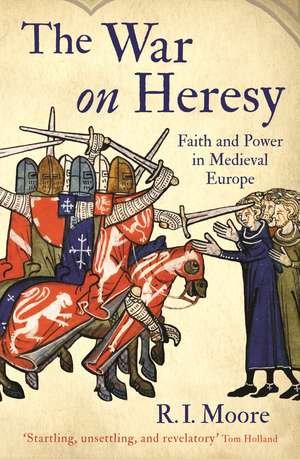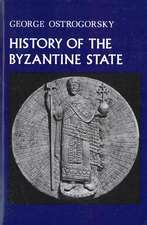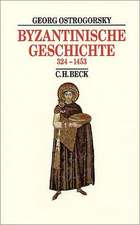The War On Heresy: Faith and Power in Medieval Europe
Autor Professor R. I. Moore Editat de John Daveyen Limba Engleză Paperback – 9 iul 2014
| Toate formatele și edițiile | Preț | Express |
|---|---|---|
| Paperback (2) | 64.65 lei 3-5 săpt. | +24.33 lei 6-12 zile |
| Profile – 9 iul 2014 | 64.65 lei 3-5 săpt. | +24.33 lei 6-12 zile |
| HARVARD UNIV PR – 2 dec 2014 | 136.26 lei 41-47 zile |
Preț: 64.65 lei
Preț vechi: 76.62 lei
-16% Nou
12.37€ • 12.92$ • 10.24£
Carte disponibilă
Livrare economică 14-28 martie
Livrare express 27 februarie-05 martie pentru 34.32 lei
Specificații
ISBN-10: 1846682002
Pagini: 416
Dimensiuni: 130 x 200 x 34 mm
Greutate: 0.3 kg
Ediția:Main
Editura: Profile
Colecția Profile Books
Locul publicării:London, United Kingdom
Notă biografică
Recenzii
Moore makes a very powerful case ... if only half of his revolutionary new claims are accepted, every encyclopedia entry on the Cathars will have to be completely rewritten
Brilliantly told, profoundly thought-provoking.
Moore's latest book is as good, and as provocative, as anything he has produced. The book is one of the finest accounts of medieval heresy that you are likely to encounter ... serves to enhance Moore's status as one of the finest historians of medieval heresy.
Elegant and intelligent.
Wide-ranging, beautifully written, and compellingly argued, this is a book that overturns the traditional picture.
Moore's approach to Catharism is intriguing and provocative. [This is] an accessible and up-to-date history of the rise of heresy persecution in the medieval West. The book will inspire ample criticism and defenses among scholars. Amateur historians will find a pleasing expository style burnished with colorful details.
A bold new vision.
An intellectual thriller ... An absolute page-turner ... Startling, unsettling and revelatory, The War on Heresy is Homeland in cowls.
The The War on Heresy is an important and well-argued book that will force scholars to re-examine the history of medieval heresy and provides the methodological blueprint for the study of heresy in the Middle Ages.
A very impressive study, made all the more accessible by the author's admirably lucid writing style
The book under review here is a brilliant and sobering meditation on this theme ... The War on Heresy is a triumph.
Beautifully written, measured, searching, and sublimely free from jargon. We are presented with eye-witness accounts that are not knocked into pre-conceived patterns. The effect is to draw the reader into not just the story but into how the story became a story in the first place. Inevitably this affords a double-take perspective, in which history and stories excitingly grow together and the reader becomes a participant.
The War on Heresy is social and religious history at its best, the fruit of many decades of intense engagement with one of the most complex and difficult problems of medieval history. With admirable clarity, R. I. Moore tells the deeply troubling story of how heretics became a persecuted minority, not so much because of their beliefs, but because of the anxieties, needs, and ambitions of their persecutors. This is a masterfully researched and deeply thought book that tells its exciting and still relevant story with verve and with sympathy for the victims of the war on heresy.
Fierce competition for power produces fierce discursive competition. In this grand and sane book, armed with many lights (intelligence, narrative skill, learning) R. I. Moore re-enters the territory of Europe's ferocious medieval competition for theological orthodoxy; wherever he ventures, he illumines what had been dark.
Descriere
The war on heresy obsessed medieval Europe in the centuries after the first millennium. R. I. Moore's vivid narrative focuses on the motives and anxieties of those who declared and conducted the war: what were the beliefs and practices they saw as heretical? How might such beliefs have arisen? And why were they such a threat?In western Europe at AD 1000 heresy had barely been heard of. Yet within a few generations accusations had become commonplace and institutions were being set up to identify and suppress beliefs and practices seen as departures from true religion. Popular accounts of events, most notably of the Albigensian Crusade led by Europe against itself, have assumed the threats posed by the heretical movements were only too real. Some scholars by contrast have tried to show that reports of heresy were exaggerated or even fabricated: but if they are correct why was the war on heresy launched at all? And why was it conducted with such pitiless ferocity? To find the answers to these and other questions R. I. Moore returns to the evidence of the time. His investigation forms the basis for an account as profound as it is startlingly original.















